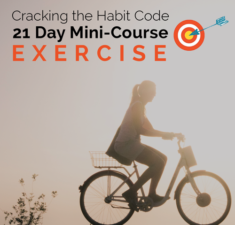Even though we say we can’t buy happiness, we often behave as though we can. Why else would we spend so much time shopping? What if I told you that you actually can buy happiness, for yourself, or for someone else? Well, you can! Here’s how.
For starters, remember that there is a huge difference between real joy — or any other positive emotion, like gratitude, or love, or hope — and the gratification that can come from buying something (or receiving a gift). Positive emotions like awe and compassion have different effects on our nervous system than material rewards, like gifts, do.
Positive emotions function to reverse stress — to put the breaks on any lingering fight-or-flight response that might be making us feel anxious or unsettled. In contrast, material purchases and gifts trigger the reward center in our brain, which usually delivers a nice hit of pleasure… and then leaves us wanting more. The lingering feeling that more would be better can be blamed on a neurotransmitter called dopamine. Though dopamine does deliver that initial pleasurable feeling, its main purpose is to create desire, or craving, in the brain, which acts as a motivating force. This is why when we treat ourselves with food or a shopping trip we are often soon left wishing for more (rather than satisfied with what we already have).
So here’s how to buy happiness: Make purchases that foster real positive emotions, either in yourself or others.
Here are some ideas for your happiness gift list:
- Buy experiences like a trip, concert, movie, or dinner out — especially those that foster connections between friends and family members. This gives people a chance to feel emotions like love, excitement, anticipation (and maybe awe, elevation, or inspiration, depending on the activity). The feeling of connection we get when we do something fun with people we love is one of our most powerful sources of happiness.
- Don’t buy gifts from a list or registry. One of the reasons that we love opening presents so much is that people find surprises exciting. Excitement is a positive emotion. This means that a gift has the potential to bring happiness mostly through the joyful anticipation it brings…not the actual gift itself, which might be gratifying but will often leave us wanting more. If a receiver chooses a gift themselves and knows what they are getting, the joyful anticipation won’t be there.
- Give something that enables the receiver to give to others. (I’m a fan of ‘Tis Best gift cards, for example.) Believe it or not, giving brings far more happiness than receiving, and so when we want to give happiness, the best thing we can do is enable someone else to be a giver. When they are able to give to people or causes they feel passionately about, gift receivers are likely to feel generosity, awe, compassion, love, gratitude, or engagement — all big and powerful positive emotions.
Looking for ways to give yourself a little pressy? Spend your money on your health. Really! Although happiness does lead to better health (primarily by reducing stress), health is also a major predictor of happiness — on average, healthy people are 20% happier. So buy yourself some vitamins, and those Zumba classes you love so much.
better health (primarily by reducing stress), health is also a major predictor of happiness — on average, healthy people are 20% happier. So buy yourself some vitamins, and those Zumba classes you love so much.
Here’s a no-brainer present for yourself: my new Establish an Exercise Habit Mini-Course, designed to teach you how to establish a lifelong exercise habit for yourself. This class is only $9.99, and I promise it will pave the way for you to be healthier AND happier in the coming year.
Happy Holidays!

